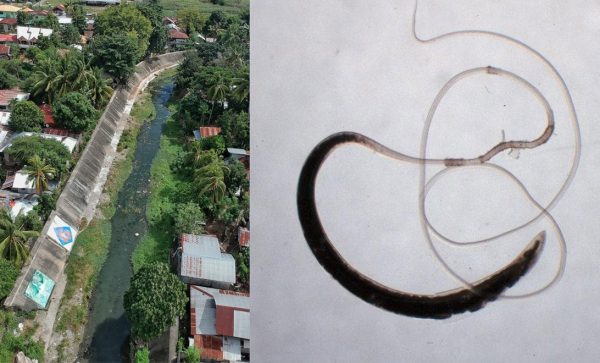
Poor Sanitation Can Cause Whipworm Infection
Whipworm infection, also known as trichuriasis, is a type of parasitic infection caused by the whipworm, scientifically known as Trichuris trichiura. This intestinal parasite primarily affects the large intestine (colon) of humans. Whipworm infections are more common in areas with poor sanitation and hygiene practices. This worm appears like a whip in shape hence the name whipworm.
How the worm gets inside our body?
Whipworm infection is typically transmitted through the ingestion of embryonated eggs. These eggs are passed in the feces of infected individuals and can contaminate soil, food, or water.
Poor Sanitation: Areas with inadequate sanitation facilities and practices are more prone to whipworm infections. Contaminated hands, food, or water sources contribute to the transmission.
One of the most common reasons for whip worm infection is, ingestion of infected eggs present in soil. Poor sanitary conditions, open defecation as well as using human feces as manure are reasons for infection. Studies also show that people with certain chromosome traits are more susceptible for trichuriasis!
Symptoms of whip worm infection:
Mild to Moderate Infections: Many people with whipworm infections may not experience noticeable symptoms. In mild to moderate cases, symptoms may include abdominal pain, diarrhea, and weight loss.
In severe infections or with chronic infections, whipworms can cause more serious symptoms such as rectal prolapse, anemia, and growth impairment in children.
According to CDC “People with heavy infections can experience frequent, painful bowel movements that contain a mixture of mucus, water, and blood. The diarrhea typically smells worse than usual. Severe cases can slow growth in children. Rectal prolapse (when the rectum sags and comes out of the anus) can also occur. In children, heavy infection may also be associated with impaired cognitive development.”
Complications: Complications of whipworm infection are more likely to occur in severe or chronic cases and may include anemia, rectal prolapse, and growth stunting in children.
Diagnosis: Diagnosis is often based on the identification of whipworm eggs in stool samples. Laboratory tests, such as a stool examination, are commonly used to confirm the presence of the parasite.
Treatment: Whipworm infections are typically treated with antiparasitic medications, most commonly albendazole or mebendazole. These medications help eliminate adult worms from the intestine. Treatment is usually well-tolerated, and a healthcare professional will determine the appropriate dosage and duration.
Prevention:
- Improved sanitation: The primary prevention measure is to improve sanitation and hygiene practices, including access to clean water, proper sewage disposal, and promoting handwashing. If sharing same bathrooms better sanitation is required so that other members of family does not get infected by using shared toilet.
- Avoid contact with soil that may be contaminated with human feces, including with human fecal matter (“night soil”) used to fertilize crops. Avoiding Soil Contamination: Minimizing contact with contaminated soil, especially in areas where the infection is prevalent, can reduce the risk of whipworm transmission.
- Wash hands with soap and warm water before handling food.
- Teach children the importance of washing hands to prevent infection.
- Wash, peel, and/or cook all raw vegetables and fruits before eating, particularly those that have been grown in soil that has been fertilized with manure.
- Education: Public health education programs can play a crucial role in raising awareness about preventive measures, such as avoiding the consumption of contaminated food and water.
- Personal hygiene: Practicing good personal hygiene, including proper handwashing after using the toilet and before handling food, can help prevent the spread of whipworm infections.
Mass drug administration (MDA) : This is a treatment for the community for soil-transmitted helminths (hookworm, Ascaris, and whipworm) and four other “neglected tropical diseases” (river blindness, lymphatic filariasis, schistosomiasis, and trachoma). According to CDC since the drugs used are safe and inexpensive or donated, entire risk groups are offered preventive treatment. Mass drug administrations are conducted periodically (often annually), commonly with drug distributors who go door to door. Multiple neglected tropical diseases are often treated at the same time using MDAs.
It is important to note that if you suspect a parasitic infection or experience symptoms, you should seek medical attention. A healthcare professional can provide an accurate diagnosis and recommend appropriate treatment. Additionally, public health measures to improve sanitation and hygiene are essential for preventing the spread of whipworm infections in communities.
References:
Image credit: Alan R Walker, CC BY-SA 3.0 <https://creativecommons.org/licenses/by-sa/3.0>, via Wikimedia Commons
Photo by Denniz Futalan: https://www.pexels.com/photo/old-village-on-river-bank-in-sunny-day-4156312/ (free for commercial use)
Author: Sumana Rao | Posted on: January 18, 2024
« These Foods Can Trigger Arthritis Symptoms Types of Glaucoma And Ways To Manage And Optimize Remaining Vision »






















Write a comment